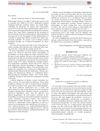Iododerma in Pregnancy Secondary to Iodinated Multivitamins
July 2015
in “
Australasian Journal of Dermatology
”
allergic contact dermatitis brimonidine facial erythema rosacea prednisolone cephalexin hydrocortisone ointment minocycline patch testing ocular allergy clonidine allergic skin reaction facial redness steroid cream antibiotic corticosteroid cream skin allergy test eye allergy blood pressure medication

TLDR A man developed an allergic skin reaction to a rosacea treatment and improved after stopping the medication and receiving allergy-specific care.
The document reports a case of allergic contact dermatitis in a 61-year-old man who used topical brimonidine for facial erythema associated with rosacea. Despite a history of various treatments, he developed a burning sensation, swelling, and erythema with scaling and mild crusting on his face after using brimonidine. A clinical diagnosis of allergic contact dermatitis was made, and he was treated with prednisolone, cephalexin, and hydrocortisone ointment, while discontinuing minocycline and brimonidine. Patch testing confirmed a positive reaction to brimonidine, among other substances. The document highlights the potential for allergic contact dermatitis from brimonidine, noting that adverse event reports from clinical trials indicate its occurrence in 1% of subjects, while ocular allergy to brimonidine has been described as ranging from 14 to 26%. The patient was able to continue oral clonidine for flushing without an allergic reaction. The authors emphasize the importance of recognizing the potential for allergic contact dermatitis with the increased availability of brimonidine.




